On this page you will find information on:
World Mental Health Day
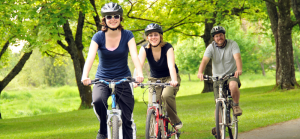
On World Mental Health Day, October 10, we encouraged Queenslanders affected by cancer to seek the help and support they deserve. Any serious illness can impact mental health. For patients, caregivers, and their loved ones, going through cancer can be an overwhelming experience.
Suddenly, you are thrust into a situation where you must deal with what is happening physically as well as emotionally.
For most people, the experience of dealing with cancer will be difficult at some stage. Whether it is at the time of diagnosis or at some later stage in the cancer journey. There is no right way to feel – experiencing a range of emotions is normal and everyone will cope differently.
These feelings may be constant, may come and go, or pass with time.
There are many ways to cope with a diagnosis and everyone is different, however looking after yourself through the below tips can enhance wellbeing and help you to manage stress better.
Keep to the basics.
Maintaining a balanced diet to help your body cope with the stress of illness and treatment, and being physically active regularly, which can help lift mood and improve sleep, are recommended.
Make time for yourself.
Even though life may be very busy, it is important to make time to do things you enjoy and help you relax as best you can. Think about things you do (or have done in the past) that help you feel good. Mindfulness and meditation are great ways to relax your mind and body.
Stay connected.
Keeping in touch with the world through work, hobbies, or time spent with family and friends may help you see a life outside of cancer and provide a break from your worries. When you are dealing with treatment and side effects, your support network can make an enormous difference. You don’t have to deal with cancer alone. Family and friends usually appreciate being allowed to provide support – it helps them feel useful.
Talk.
It is important for you to talk about your feelings and what you are experiencing if you want to. If you cannot talk to someone close to you or would like to talk to someone other than relatives or friends, you might consider talking to a health professional or engaging with a support group.
Sort out issues.
A cancer diagnosis may happen in the context of other life stresses such as financial problems, work-related issues, relationship concerns and family stresses. Dealing with other sources of stress, where possible, in your life may help you cope better with the additional burden of cancer treatment.
It’s important to remember that nobody is expecting you to put a brave face all the time – embrace and expect a range of emotions. It’s also important to remember that Cancer Council Queensland is here for you and has a range of support services available.
To find out what might best suit your needs you might like to speak to one of our Cancer Support and Information health professionals by calling Cancer Council’s 13 11 20. Last year alone, more than 9480 calls were made to this service.
Open Monday to Friday, 9am to 5pm (excluding public holidays), 13 11 20 exists thanks to the generous donations, support and contributions of Queenslanders.
Meet hospital-based and lodge volunteer, Helen Atkinson
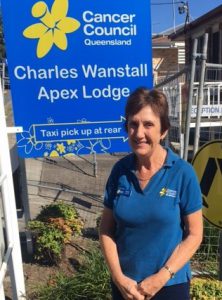
It’s a special moment in the day, one many patients look forward to, perhaps relieving the boredom, or the chance to see a friendly face and have a chat or share some fears about their future.
This is the special role Helen Atkinson plays in many lives as both a hospital-based and lodge volunteer at our Charles Wanstall Apex Lodge in Brisbane.
My hope for the future is that every patient receiving cancer treatment knows about the practical and emotional services Cancer Council Queensland can provide to help them. – Helen Atkinson
Close to going on an overseas trip with her daughter, Helen was diagnosed with breast cancer after a regular mammogram in 2013. With no history of cancer in her family and having always been proactive about health Helen felt overwhelmed by the diagnosis and bombarded with tests and information about what was happening.
Helen resigned from her job, so she could face what the surgeon described would be a ‘torrid year.’ Taking a one step at a time approach she listened to all advice and learned how best to help herself through treatment and recovery. Trying not to push beyond what her body was telling her.
Joining a support group was of enormous psychological benefit during the 18 weeks of chemotherapy and 5 weeks of radiation therapy. And now, five years later, is one of the reasons why Helen volunteers with Cancer Council Queensland.
“I want to help as many cancer patients as possible, so they know about the practical and emotional support services they can access through CCQ.”
The second reason is to support patients from rural and regional areas. Hearing their stories over morning tea at the Lodge leaves Helen impressed by the generosity of human spirit in the community.
“I meet people who live a long way from Brisbane but need to be here for weeks at a time for daily treatments. The grass still grows on their lawns, their animals still need feeding, their business’s need to keep going to pay their bills, and they can’t be at home. They are unwell and often need someone looking after them in Brisbane. But inevitably, family, old friends, or neighbours, step up, and carry the load at home.”
“It’s inspiring to meet some patients again when they return for check-ups. I’ve spoken with them when they started treatment and didn’t know what to expect, supported them when the treatment knocked them around a bit, and met them again when they come in for a check-up looking much better.”
Helen finds her roles providing morning tea for residents at Charles Wanstall Lodge and visiting patients at the Royal Brisbane Women’s Hospital complement each other well.
“I sometimes meet patients in the hospital who will be going from hospital to the Lodge. I can answer their questions and hopefully ease their worries a little. On the other hand, I meet patients in the hospital who have been staying at the Lodge, so I am a familiar face to them if they have attended a morning tea.”
The morning teas offer a chance for residents and carers to meet, often becoming a support to each other as they progress through treatment. Among other things, they share recipes as taste buds may change during treatment, and ideas of how to fill in the weekends. Helen then takes the opportunity to make sure they know about the many support services Cancer Council Queensland has available.
Helen has made lasting connections with other volunteers and knows she can reach out to the Cancer Council Team for support if necessary.
“The training I received as a volunteer has really helped me separate the support I’m giving to patients from my own circumstances … if I find a visit very emotional, I know it’s okay to have a break.”
Every day, we’re working hard to ensure that no Queenslander faces cancer alone. With the ongoing support and generosity of the community we can continue to do this.
Complete your health checklist today

We can all be guilty of putting some of these health appointments off when life gets busy – sometimes the hardest part is just booking the appointment.
There are a number of health checks we can all be doing each year to keep track of our health. This month we have put together a simple health checklist to serve as a refresher of some of the checks you should consider.
While we are not all eligible to participate in each item on the checklist, we suggest you print it off, tick off the checks you have completed and cross out those you are ineligible for – then book in for those appointments left on the list.
When you print off your health checklist, you will also notice that there is a second checklist on your page – please cut this off and give it to a friend or family member as a prompt for them to check in on their health checks for 2018.
Australian Cancer Atlas
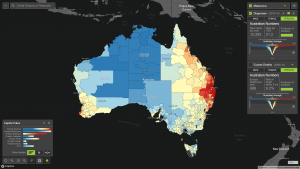
The launch of the Australian Cancer Atlas by researchers from Cancer Council Queensland, QUT (Queensland University of Technology) and FrontierSI, means now all Australians can discover the impact of cancer in their communities
Look up your suburb or town to see how diagnosis and survival rates compare with the national average for the 20 most common cancers at atlas.cancer.org.au.
The project builds on years of work by Cancer Council Queensland to better understand the cancer divide between metropolitan and rural areas, and map the gaps linked to socio-economic status and other demographic factors.
In 2018 an estimated 138,000 Australians will be diagnosed with cancer, but we know that some people face greater risks of diagnosis and death than others, due to a mix of lifestyle characteristics, behaviour, genetics and other unknown factors.
The atlas enables readers to easily visualise those differences and offers critical insight into patterns of cancer and outcomes in Australia, depending on where people live, which can be used to drive research and policies going forward.
Stay safe in the sun with our free app
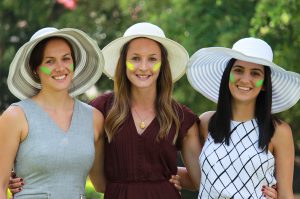
Did you know that Queensland has the highest rate of skin cancer in the world?
Each year in Queensland around 324,000 non-melanoma skin cancers and 3700 skin cancers are diagnosed each year.
Thanks to your support, every day our education and prevention programs are helping Queensland families lower their cancer risk. Our nutrition and exercise education campaigns are inspiring Aussie families to lead a healthy lifestyle, and for the past 20 years, our SunSmart Schools program has empowered a generation of Queensland kids and their families to protect themselves from UV. The program currently protects 48,500 children against the Queensland sun in childcare centres and schools across the state thanks to donations from people like you.
Sun protection is required when the UV Index is three or above – and we see the UV Index far exceed that even in winter here in Queensland.
Once skin damage occurs from UV radiation, it is impossible to reverse, but it’s never too late to make improvements to your sun protection behaviours.
With our free SunSmart app you can check the UV levels and stay protected all year round.
Regional cancer support trip
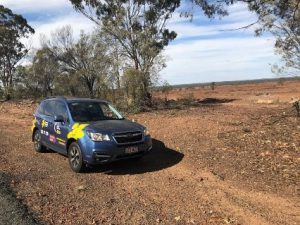
A key part of our mission is reducing the burden of cancer for all Queenslanders no matter where they live. We do this by helping to ensure people have access to support services and resources and advocating to help reduce regional disparities.
Recently Alyce Morris, our South West Queensland coordinator for cancer support and the health promotion officer from Darling Downs Hospital and Health Service’s Bowel Cancer Screening program embarked on a road trip.
They visited over 20 GP clinics, Aboriginal Medical Services, hospital and the Royal Flying Doctor Service across Dalby, Chinchilla, Roma, Charleville, Cunnamulla and St George.
The aim of the trip was to share information about the three national screening programs (breast, bowel and cervical), and they reached around 60 health professionals over the four days.
